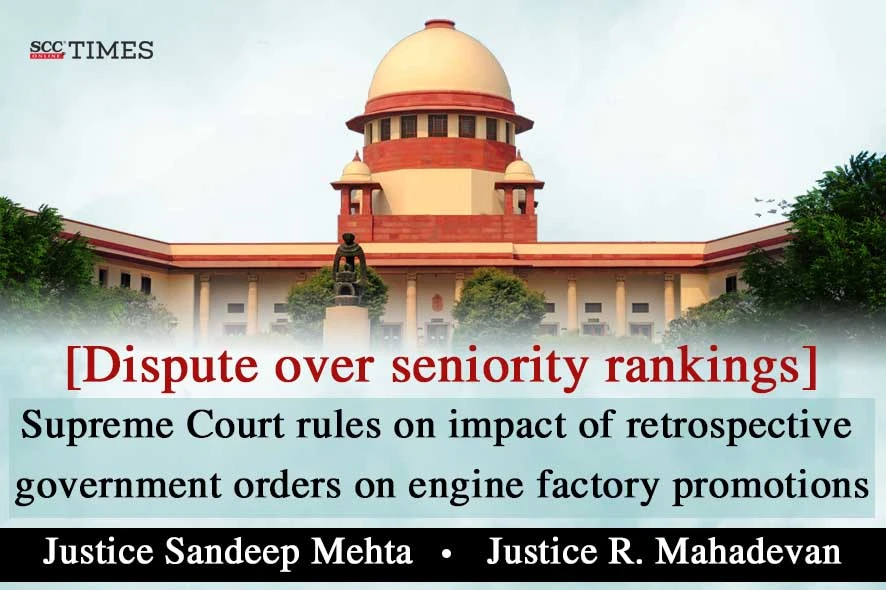Supreme Court: In a civil appeal against the judgment passed by Madras High Court, whereby the Court reversed the judgment passed by the Central Administrative Tribunal, rejecting the Original Application, challenging the proposed action of revision and fixation of appellants seniority in the Engine Factory, the division bench of Sandeep Mehta and R. Mahadevan, JJ. while upholding the impugned judgment viewed that the subsequent Government Order dated 4-08-2015 cannot be read as a clarification and therefore cannot be made applicable retrospectively. The said GO has substantively modified the position governing seniority in the Industrial Establishments by reviving the earlier OM, and supersedes the orders/circulars, which were holding the field over more than a decade. Therefore, giving retrospective effect to the GO dated 4-08-2015 would have catastrophic effect on the seniority of the entire cadre.
Background:
The appellant and the private respondents were engaged on semi-skilled posts such as Fitters and Machinists in a Factory. A common select list of candidates based on merit was issued by the General Manager of the Factory in the year 1995, wherein the appellant was placed at a higher position than the private respondents. An appointment order dated 17-01-1996 was issued in the favour of the appellant for the post of ‘Fitter General(semi-skilled)’ in the Factory. He was initially placed on probation for a period of two years which was further extended for a period of six months, e.f. 17-01-1998. The appellant satisfactorily completed the probation period on 16-07-1998. Thereafter, he was promoted to the ‘Skilled’ grade on 6-01-1999.
A draft seniority list dated 28-07-2006 was issued by the Factory, whereby the seniority of ‘Fitters’ was fixed as per their respective dates of promotion to the skilled grade and the appellant was placed at a lower position than the private respondents.
Aggrieved of the draft seniority list, the appellant submitted a representation to the General Manager seeking necessary amendments in the draft seniority list and to fix his position appropriately and thereafter, to publish a final seniority list. The General Manager rejected the aforesaid representation observing that his seniority had been fixed from the date of holding the skilled grade, and thus the position of the appellant in the seniority list was not liable to be altered.
Being aggrieved, the appellant preferred Original Application before the CAT challenging the draft seniority list. The Tribunal directed that the appellant was entitled to be considered for his claim of seniority and directed respondents to revise the seniority list accordingly.
The private respondents assailed the order passed by the CAT before the Madras High Court , wherein the Court directed Union of India and the Factory to restore the seniority of the writ private respondents, holding that they are senior to the appellant , both as per the date of initial appointment and also in the promotional post of skilled grade. The High Court held that an employee selected in the semi-skilled grade is required to complete the probation period satisfactorily and has to pass the requisite trade test prescribed for the post before he can be confirmed and promoted to the skilled grade.
Analysis and Discussion:
The Court noted that the High Court has recorded a categoric finding that even if the date of appointment is taken into consideration, the private respondents are senior to the appellant. The Court said that this finding is prima facie erroneous because the appellant was placed at position and the private respondents were placed at the 30th, 31st and 32nd positions in the order of merit, as borne out from the record. Further, the sole ground taken by the private respondents to oppose the prayer of the appellant was that the appellant was not able to complete his probation period and pass the trade test on time and thus, he was placed below the private respondents in the draft seniority list.
Whether the seniority of the appellant is to be reckoned from the date of induction/initial appointment or as per the date of promotion/confirmation in the skilled grade?
The Court reiterated that once an incumbent is appointed to a post according to the rules, his seniority has to be reckoned from the date of the initial appointment and not according to the date of confirmation, unless the rules provide otherwise. Thus, when an employee completes the probation period and is confirmed in service albeit with some delay, the confirmation in service shall relate back to the date of the initial appointment. Any departure from this principle in the form of statutory rules, executive instructions or otherwise must be consistent with the requirements of Articles 14 and 16 of the Constitution of India.
Whether the extant rules/regulations/circulars prevailing in the establishment contained any stipulation that the completion of the probation period and the passing of the trade test is sin qua non for being promoted to the skilled grade and if so, whether the seniority of the employees selected on the same date would have to be reckoned from the date of confirmation/passing the trade test or from the date of initial appointment?
The Court took note of the Government Order dated 24-12-2002, issued by the Ordinance Factory Board placed on record clarifies the position regarding counting of seniority in the trades for the industrial establishments. It clears that the seniority in the skilled grade would have to be reckoned from the date of promotion to the skilled grade and not from the date of induction/entry in the semi-skilled grade and the candidate joining service in the semi-skilled grade would be mandatorily required to complete the probation period and also to clear the trade test for being promoted to the skilled grade.
The Court further took note of the GO dated 04-08-2015, wherein, the rule position qua the fixation of seniority has been restored to be governed by Office Memorandum dated 04-11-1992, according to which the relevant date for fixation of seniority would be the date of initial appointment and not the date of upgradation/promotion to the skilled grade.
The Court said that the clarification issued vide GO dated 04-08-2015 does not operate retrospectively as it is specifically provided in the said GO that “henceforth”, the seniority in respect of Industrial Establishments will be governed by the relevant clause of OM.
The Court reiterated that an Office Memorandum/Government Order cannot have a retrospective effect unless and until there is an express provision to make its effect retrospective or that the operation thereof is retrospective by necessary implication.
The Court further emphasized that if a Government Order is treated to be in the nature of a clarification of an earlier Government Order, it may be made applicable retrospectively. Conversely, if a subsequent Government Order is held to be a modification/amendment of the earlier Government Order, its application would be prospective as retrospective application thereof would result in withdrawal of vested rights which is impermissible in law and the same may also entail recoveries to be made.
Thus, the Court viewed that the subsequent GO dated 4-08-2015 cannot be read as a clarification and therefore cannot be made applicable retrospectively. The said GO has substantively modified the position governing seniority in the Industrial Establishments by reviving the earlier OM, and supersedes the orders/circulars, which were holding the field over more than a decade. Therefore, giving retrospective effect to the GO dated 4-08-2015 would have catastrophic effect on the seniority of the entire cadre.
The Bench inferred that before the GO dated 4-08-2015 was issued, seniority of multitudes of employees must have been fixed according to the GO dated 24-12-2002, which is according to the date of promotion to skilled grade and not from the date of induction/entry in semi-skilled grade. Thus, respondent 3, 4 and 5 who were below the appellant in the order of merit at the time of induction in the semi-skilled grade, have been promoted to the skilled grade and the highly skilled grade much before the appellant by application of the GO dated 24-12-2002. The appellant did not question their promotions before any Court or Tribunal at any stage.
Thus, the Court remarked that “much water has flown under the bridge and retrospective application of the GO issued in 2015 would open floodgates of litigation and would disturb the seniority of many employees causing them grave prejudice and heartburn as it would disturb the crystallized rights regarding seniority, rank and promotion which would have accrued to them during the intervening period”.
The Court viewed that the applicability of the Government Order dated 4-08-2015 cannot enure to the benefit of the appellant as its operation is clearly prospective. Thus, the impugned Judgment was upheld.
CASE DETAILS
|
Citation: Appellants : Respondents : |
Advocates who appeared in this case For Petitioner(s): For Respondent(s): |
CORAM :










